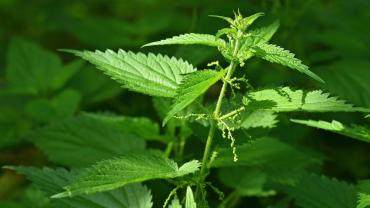
Nettles, also known as “stinging nettle” (Urtica dioica L.), have traditionally been used worldwide as a folk medicine remedy for supporting respiratory and joint health and various other applications, such as hypertension. Documentation points to its use in ancient Egypt and ancient Greece and among the indigenous peoples of North America. It can be consumed directly or made into soups and tea and even brewed into beer. Emerging research demonstrates nettles' ability to support overall immune health.
Nettles have a very high vitamin C and iron content, which underlies their role in promoting healthy immune responses by promoting antioxidant status, healthy inflammatory responses, and modulating histamine release. Specific bioactive compounds in nettles, including adenine, nicotinamide, synephrine, and ostiole, promote healthy inflammatory responses and have been shown to help mitigate the adverse effects of occasional allergies and inflammatory conditions. Synephrine, an alkaloid, has a long history of being used as a nasal decongestant in traditional Chinese medicine.
Recent in vitro research has shown that nettle extract inhibits several vital inflammatory events that can cause allergic rhinitis symptoms. These include blocking histamine production/release, inhibiting mast cell degranulation, and decreasing the release of pro-inflammatory cytokines and chemokines associated with allergy symptoms.
Nettle has also been shown to attenuate the proliferation of various gram-negative and gram-positive bacterial strains in vitro, such as Streptococcus pyogenes, Streptococcus pneumoniae, Shigella flexneri, Pseudomonas aeruginosa, Escherichia coli, Salmonella typhi, Staphylococcus aureus, and Klebsiella pneumoniae. Animal studies demonstrate nettles’ ability to inhibit inflammatory cell recruitment and allergen-induced lipid peroxidation, offering potential clinical benefits for those with asthma.
In one randomized, double-blind clinical trial, 40 patients with signs and symptoms of allergic rhinitis received either a placebo or nettle extract (150 mg/day) for one month. All patients were co-administered with other daily routine treatments for allergic rhinitis. At the end of the study, the patients receiving nettle extract displayed significantly decreased severity of clinical symptoms. They also exhibited a significant reduction in mean nasal smear eosinophil count and reduced IFN-gamma levels compared to placebo. These results suggest that nettles may potentially be clinically supportive for those with allergic rhinitis.
Stinging nettles may have synergistic effects with other immune-supportive herbs, such as quercetin, which can help promote healthy histamine metabolism and immune balance. Although more randomized clinical studies are needed on the effects of stinging nettles, this herbaceous perennial plant shows promise in helping support immune health.
By Danielle Moyer Male, MS, CNS, LDN, and Caitlin Higgins, MS, CNS